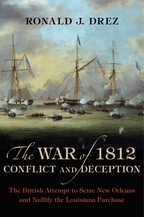History buffs often discount the importance of the Battle of New Orleans, fought on January 8 200 years ago, but the unlikely victory of the fledgling U.S. militia over the highly trained British army remains one of the most astonishing and critical events in American history. Though the Treaty of Ghent, which officially ended the War of 1812, had been signed on Christmas Eve, the pivotal battle fought just 4 miles downriver from the French Quarter firmly established U.S. control over the Mississippi River Valley.
 Now, on the cusp of the battle’s 200th anniversary, several new books have emerged that re-examine its significance. Award-winning author and commander Ronald J. Drez (“The War of 1812: Conflict and Deception”), history professor Ron Chapman (“The Battle of New Orleans: But for a Piece of Wood”), director of the Louisiana Institute of Higher Education Curtis Manning (“The Battle of New Orleans Reconsidered”) and businessman and tourism consultant Morgan Molthrop (“Andrew Jackson’s Playbook: 15 Strategies for Success”) approach the most exciting conflict in Louisiana history from totally different perspectives — though all agree upon its impact.
Now, on the cusp of the battle’s 200th anniversary, several new books have emerged that re-examine its significance. Award-winning author and commander Ronald J. Drez (“The War of 1812: Conflict and Deception”), history professor Ron Chapman (“The Battle of New Orleans: But for a Piece of Wood”), director of the Louisiana Institute of Higher Education Curtis Manning (“The Battle of New Orleans Reconsidered”) and businessman and tourism consultant Morgan Molthrop (“Andrew Jackson’s Playbook: 15 Strategies for Success”) approach the most exciting conflict in Louisiana history from totally different perspectives — though all agree upon its impact.
 Where Chapman takes a scholarly view and Drez analyzes Jackson’s military strategies, Molthrop folds the battle into the context of New Orleans’ enduring cultural history, extracting lessons for contemporary readers. Molthrop became fascinated with the persona of the frontier general, who later used his military fame as a platform for election to the U.S. presidency.
Where Chapman takes a scholarly view and Drez analyzes Jackson’s military strategies, Molthrop folds the battle into the context of New Orleans’ enduring cultural history, extracting lessons for contemporary readers. Molthrop became fascinated with the persona of the frontier general, who later used his military fame as a platform for election to the U.S. presidency.
Through creative storytelling and personal insights, Molthrop asserts that the character traits, tactics and determination Jackson demonstrated in defeating the far better trained British army are the very qualities that ignited New Orleans’ post-Katrina recovery. Above all, Jackson had the charisma to unite diverse groups and convince them to follow his leadership, pledging to die before surrendering to the British.
By interviewing a wide array of recognizable local sources, Molthrop juxtaposes events from 1815 with those of 2005, demonstrating unconventional strategies that achieved improbable victories.
Molthrop will be discussing “Jackson’s Playbook” at 7 p.m., Tuesday, Jan. 6 at the Jefferson Parish Main Library and on the anniversary date at 7 p.m., Thursday, Jan 8, at the New Orleans Athletic Club. Both events are free and open to the public.
 NOLAbeings Multimedia artist Claire Bangser created NOLAbeings as a portrait-based story project that marries...
NOLAbeings Multimedia artist Claire Bangser created NOLAbeings as a portrait-based story project that marries...  Voodoo in New Orleans: Reviving history: New Orleans fortune telling This article takes a deep dive into the history of Voodoo in New Orleans, its hybridization with Catholicism, and its present-day place in the city's culture. The author visits fortune-tellers in the French Quarter, using their guidance as a tool for introspection rather than a deterministic predictor of the future. Through her experiences in New Orleans, the author feels a mystical connection to both the past and the future.
Voodoo in New Orleans: Reviving history: New Orleans fortune telling This article takes a deep dive into the history of Voodoo in New Orleans, its hybridization with Catholicism, and its present-day place in the city's culture. The author visits fortune-tellers in the French Quarter, using their guidance as a tool for introspection rather than a deterministic predictor of the future. Through her experiences in New Orleans, the author feels a mystical connection to both the past and the future. 